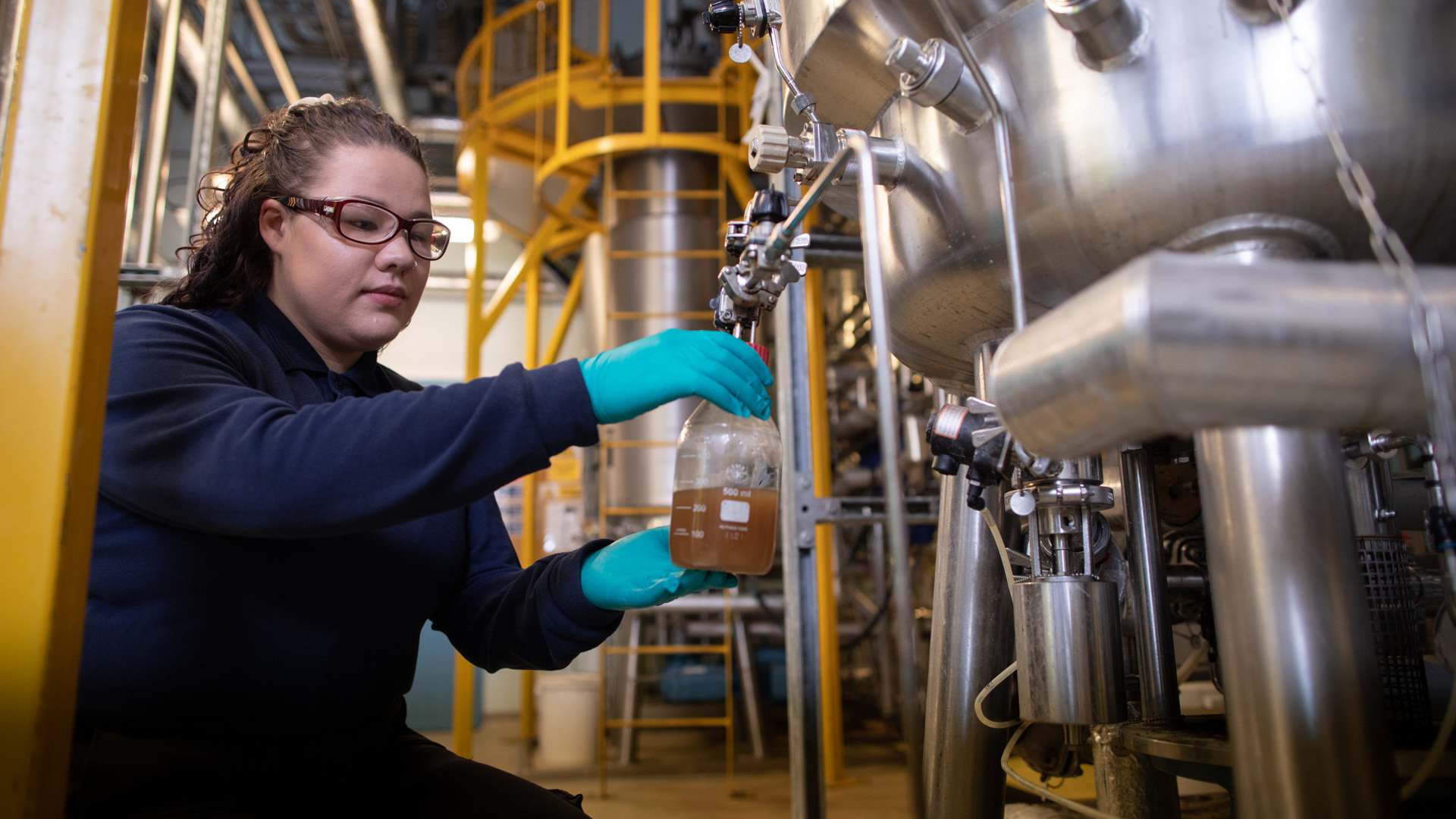Engineering Biology in the UK: Are we ready to scale?
Can the UK scale engineering biology? Discover the funding, skills, and infrastructure gaps limiting biotech commercial success.

Director of Biotechnology

Engineering biology has the potential to revolutionise industries from healthcare and sustainable materials to food production and biofuels. The UK has long been a global leader in this space, supported by a strong academic base and a growing number of start-ups pushing the boundaries of synthetic biology. However, despite early successes, the UK risks losing its competitive edge due to critical challenges in scaling up engineering biology innovations.
A recent report by the House of Lords Science and Technology Committee (Don’t Fail to Scale: Seizing the Opportunity of Engineering Biology) highlights the urgency of addressing investment shortfalls, regulatory barriers, and talent shortages to ensure that engineering biology thrives as a commercial sector in the UK.
The question is no longer whether the UK can lead in engineering biology. It’s whether we can remove the barriers that prevent companies from scaling here.
The UK’s engineering biology strengths
The UK has significant strengths in engineering biology, including:
- A world-class research base – The UK ranks among the top countries for synthetic biology research and academic output.
- A strong start-up ecosystem – The country has produced many engineering biology companies relative to its size.
- Established infrastructure – The UK has a strong network of scale-up facilities that support the transition from lab-scale to commercial production.
- Government recognition — The UK government has classified engineering biology as a “critical technology,” and through the National Vision for Engineering Biology, it has committed to investing £2 billion over the next decade.
Despite these advantages, the UK has struggled to translate research excellence into large-scale commercial success. Many promising companies move overseas once they reach a certain size because they face barriers to funding and scale-up support.
The issue is not the availability of infrastructure – the UK has well-established open-access engineering biology scale-up facilities, including CPI, IBioIC, BDC, Beacon Centres in Wales as well as other private and academic capabilities. However, many SMEs find it challenging to access these resources due to restrictive funding structures and limited financial support for scale-up activities. Without action to improve funding accessibility, the UK risks losing its competitive edge as companies look to countries with more SME-friendly funding models that make the transition from research to commercialisation significantly easier.

The scale-up challenge
Manufacturing Scale Challenges: Bridging the Gap to Commercial Success
The UK boasts strong pilot-scale infrastructure to support companies developing engineering biology innovations. However, a critical challenge emerges when businesses attempt to move from pilot-scale to full commercial manufacturing. This leap often proves difficult due to limited access to large-scale facilities and the significant investment required for commercial production.
One of the key factors influencing this challenge is the relationship between product value and production volume. Generally, the lower the value of a product, the higher the volume required to compete in global markets:
- Pharmaceuticals: £100s/kg — small, specialised batches.
- Foods & Nutraceuticals: £10 – 100/kg — hundreds to thousands of tonnes.
- Speciality Chemicals: <£10/kg — thousands to tens of thousands of tonnes.
- Commodities & Fuels: <£1/kg — mass production in the millions of tonnes.
To successfully commercialise a product, companies must deliver it at the right quality and at a scale that meets market and regulatory demands. Customers and partners need assurance that sufficient quantities are available before committing to application testing or adoption. The jump from open-access infrastructure (e.g., fermenters of ~10m³) to commercial-scale production (multiple fermenters exceeding 100m³ each) is often where companies face a stark choice: scale abroad, secure significant investment, or risk stagnation or failure.
The House of Lords report recognises this, noting that while the UK’s pilot-scale infrastructure is well-established, accessibility must be improved, and support for manufacturing-scale expansion is lacking. It recommends government intervention through block grants to support the ongoing costs of operating and maintaining open access pilot facilities, mirroring European funding models that subsidise infrastructure access. Without addressing these financial barriers and the manufacturing-scale gap, UK innovators will continue to seek opportunities elsewhere.
Investment gaps: A missing middle for scale-up funding
While the UK has substantial early-stage funding (e.g., through Innovate UK), there is a critical funding gap for scale-up. Many engineering biology firms struggle to secure investment between initial R&D grants and the later-stage capital required to build manufacturing capacity.
The House of Lords report calls for the UK to strengthen its venture capital and industrial investment landscape, highlighting that the US and China offer significantly greater financial support for companies in this sector. However, the disparity between UK and European funding mechanisms for accessing scale-up infrastructure is an equally pressing issue.
Across many European countries, governments actively subsidise access to scale-up facilities, helping SMEs bridge the gap between pilot-scale development and commercial production. These funding schemes significantly lower costs for businesses, making it easier for them to access essential infrastructure. Without similar support mechanisms, UK companies often struggle with higher costs, limiting their ability to scale.
Current grant funding mechanisms in the UK can be highly restrictive for SMEs relying on support from the UK’s RTO network for scale-up support. Capping RTOs at 30% of the total costs on a CRD bid, for example, significantly limits the amount of support that can be offered to SMEs. This requires the SME to create significant packages of work to deliver and match fund themselves to ‘unlock’ the RTO support they need. Removing this cap would make a huge difference to SMEs relying on RTOs to support the next step of their scale-up, meaning they could access just the support they need without having to increase the size of their funding demand to accommodate the restrictions of the funding. Addressing these structural funding issues is essential if the UK is to retain and grow its engineering biology sector.

The skills shortage: A workforce gap in bioprocessing and scale-up
The UK needs more skilled professionals with expertise in bioprocessing, fermentation, and biomanufacturing to meet the needs of a scaling industry. The House of Lords report highlights the importance of:
- Expanding doctoral training programmes to include industrial placements.
- Developing Master’s conversion courses to bring talent from other disciplines into engineering biology.
- Creating apprenticeships and technician training schemes to build a workforce for scale-up facilities.
Organisations like CPI are already playing a key role in addressing this challenge. Currently, around 10% of CPI’s technical workforce consists of apprentices and university placement students, reflecting our commitment to developing the next generation of engineering biology scale-up experts. By providing hands-on experience in biomanufacturing and process development, we are bridging the talent gap and ensuring that the UK continues to build the skills needed to scale engineering biology innovations effectively.
With continued strategic investment in skills development, the UK can strengthen its position as a home for bio-based manufacturing expertise, reinforcing its ability to scale engineering biology innovations effectively.
Recommendations - How the UK can build a competitive scale-up environment
- Funding existing scale-up infrastructure – The House of Lords report explicitly calls for increased government support for facilities like CPI, stating:
“The Government should provide more funding to enable greater use of existing engineering biology research infrastructure, such as the biofoundries and CPI. This could be in the form of block grants for those institutions to maintain their operations and reduce the cost recovery that they must charge users, or grants for using these facilities, as the EU offers for the Bio Base Europe Pilot Plant.”
By reducing the cost burden on SMEs and lowering financial barriers to accessing scale-up resources, the UK can enable more businesses to develop and commercialise their innovations domestically.
- Redesigning funding mechanisms to meet SME needs – Current structures, like the 30% RTO cap, restrict companies from fully leveraging the UK’s existing scale-up capability through grant funding. Reforming these mechanisms would allow SMEs to maximise available expertise and infrastructure.
- Simplifying the regulatory landscape – Establishing clear, well-resourced regulatory pathways for engineering biology applications.
- Training the workforce – Expanding industrial training programmes and bioprocessing apprenticeships to ensure a pipeline of skilled workers.
A small window of opportunity
The UK has all the ingredients to become a global leader in engineering biology – world-class research, innovative companies, and government backing. However, unless urgent action is taken to address scale-up barriers, the country risks losing talent, companies, and economic benefits to competitors with better investment climates.
The House of Lords report makes clear recommendations, particularly around funding infrastructure like CPI and ensuring the UK has a competitive answer to scale-up facilities like those in Europe.
By acting now, the UK can unlock the full potential of engineering biology, creating sustainable, bio-based industries that drive economic growth while addressing global challenges in healthcare, food security, and environmental sustainability.
For more information

Enjoyed this article? Keep reading more expert insights...
CPI ensures that great inventions gets the best opportunity to become a successfully marketed product or process. We provide industry-relevant expertise and assets, supporting proof of concept and scale up services for the development of your innovative products and processes.
